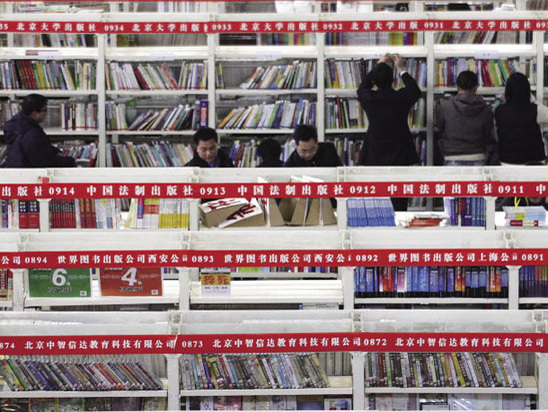|
 |
|
The 2009 Beijing Book Fair. |
Opening the Gates of Wealth
Enter any bookstore and you will find masses of books telling you how to choose stocks or double your wealth. The first book about getting rich in China was Rich Dad, Poor Dad by Robert Kiyosaki. The title overrun American bestseller lists in 1999, and reached China the following year. It topped the nation's book sales for 18 consecutive months, and stayed in the top 10 for two and half years. Sales reached 5 million copies, but a survey showed more than 30 million people had read it. Rich Dad, Poor Dad brought the concept of Financial Intelligence Quotient to China, a real shock for a country where talking money was traditionally regarded as disgraceful. The media called it the "enlightenment of Chinese financing," and the book became an object of study at Renmin University and other colleges.
Other imported money-focused bestsellers followed suit. In 2002, Spencer Johnson's tiny Who Moved My Cheese? kept Chinese talking about cheese all year, although no one in this country really likes the odd smelling food. Since it met people's enthusiasm for career success, sales reached a million copies that year.
From self-help to career planning to economic hotspots, the reading agenda was set by social changes as well as publishers' promotions. The 2007 bestseller was War of Currencies, which also sold a million copies. In this novel, the author expressed his view that "controlling money means control of society," which was criticized by academia. It was even listed in the Top 10 Bad Books in the morning newspaper Xiaoxiang Chenbao.
But criticism has not been an impediment to people's enthusiasm for money-orientated books. The country's double-digit growth from 2002 to 2008, and the expanding real estate and stock markets spurred the money-focused book market further. In 2007, total sales of finance books in China surpassed 100 million copies, outperforming all other genres. Although the financial crisis emerged in the second half of 2008, the genre remained popular, with titles like Subprime Mortgage Crisis, Breakdown of US Dollars, and George Soros Leads You Out of Financial Crisis all selling well.
Fast Food, Traditional Culture
With Confucius as its representative, Chinese traditional culture has drawn more and more attention from the West. Chinese have also been cultivating their interest in the wisdom of their ancestors. Some colleges have added traditional culture to their curriculums, and education officials have called on the public to read the classics.
The popularity of two scholars showed that Chinese liked the classics, but not enough to read them. Professors Yi Zhongtian and Yu Dan were popular with the public after they translated classics into modern Chinese.
The CCTV program Lecture Room acquainted the public with Professor Yi. The academic from Xiamen University was invited to give speeches about figures in the Han Dynasty (206BC-AD220) and the Three Kingdoms (220-280). His words were plain and funny, meeting people's demand for more historical knowledge.
Copyright on Tasting the Three Kingdoms I was obtained by the Shanghai Literature and Art Publishing Group, which promised the author an initial print run of 550,000 copies and 14 percent royalties. Thus far, over 2 million volumes have been sold. The second book of the series has been a hit too, with a first print run of over a million. According to the publisher, Professor Yi's six books have generated profits of close to RMB 100 million in the last two years.
Yu Dan, a professor at Beijing Normal University, became a household name through the same program. She gave speeches about The Analects of Confucius in October 2006. A month later, all her speeches were collated and published by Zhonghua Book Company, and sold a record of 4 million copies. The title has now been reprinted more than 20 times. Copyright for Japanese and English versions have been purchased. In March 2007, her second book After Reading the Book of Master Zhuang was published. This work collected Professor Yu's thoughts after reading the Taoist classic written by Master Zhuang and his followers. One million copies were sold within 13 days.
The popularity of history and the classics has produced cultural parvenus, as well as scholars and professors. The 2006 bestseller list saw Things of the Ming Dynasty I at the top of the history genre. This book was a collection of blogs by Dangnian Mingyue, a 26-year-old amateur history researcher and public servant from Guangzhou. He told history using Internet slang and expressed non-mainstream views, attracting over a million hits on his blog. Six volumes of his work have now been published, with sales of over 3 million copies.
| 